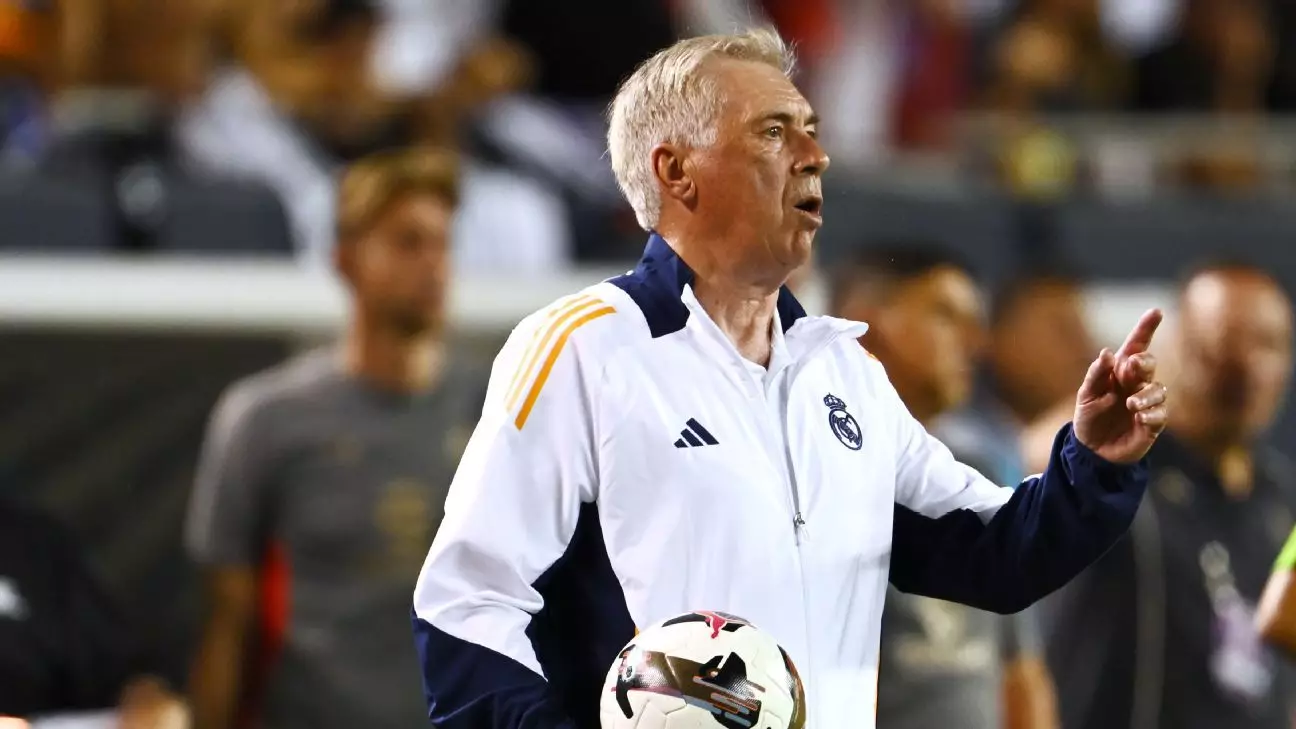In the evolving landscape of professional football, the toll of an intensified schedule on players is becoming increasingly evident. Carlo Ancelotti, the esteemed manager of Real Madrid, recently highlighted a critical issue during a press conference: the excessive number of games players are expected to compete in, which could reach an alarming 85 this season due to an expanded Champions League and a notably revamped Club World Cup. These developments have incited a chorus of players expressing their discontent over the mounting fatigue and potential for injury, as they navigate through an extraordinarily packed calendar. Such concerns are underscored by Manchester City’s Rodri, who warned that the players are nearing a breaking point, potentially even strike action, to protest the overwhelming demands of their profession.
Ancelotti proposes an intriguing solution: players may be willing to accept pay cuts if it leads to a reduced number of fixtures. His assertion places player welfare at the forefront, arguing that the primary objective of football should be to protect athletes from injuries. The notion that a reduction in games could align with salary decreases reflects a deeper, often unspoken, consideration regarding the future of the sport. This perspective prompts a reevaluation of priorities within football circles, emphasizing the need to balance commercial interests with the physical and mental well-being of players. This discourse is critical as the current environment leans heavily toward maximizing revenue without considering the implications for player health.
Despite the mounting discontent, Ancelotti asserts that the existing calendar won’t be altered this season, regardless of the friction between coaches and players. He emphasizes the importance of adopting a reflective mindset, especially among players who are experiencing the brunt of this operational strain. Ancelotti’s position indicates a broader reluctance within the football industry to address scheduling conflicts effectively. This reluctance may stem from a fear of destabilizing the competitive balance and financial prospects that accompany a full fixture list. Thus, football stakeholders must confront the reality that the relentless pace and compact schedules could lead to lasting repercussions on the sport’s most valuable asset—its players.
As Real Madrid gears up for their upcoming clash against Espanyol, Ancelotti remains optimistic about the team’s form, despite acknowledging that they have yet to hit their stride early in the season. This begins to paint a picture of a team grappling with expectations while simultaneously working to foster a winning mentality, even amidst the fatigue of a demanding schedule. While they commenced their Champions League campaign with a commendable victory against Stuttgart, the pressing question remains: can Los Blancos elevate their performance amid such taxing demands?
Ancelotti acknowledges the challenge at hand, noting that peak performance typically emerges later in the season. The team’s current standing in LaLiga, trailing behind rivals like Barcelona, reinforces the urgency to quickly find their rhythm. As the coach contemplates possible tactical adjustments, such as altering formations to achieve greater balance, he emphasizes that true stability is not merely a matter of personnel shifts but requires collective effort and sacrifice from the squad.
Investment in Emerging Talent
Ancelotti’s comments about developing young talent resonate strongly in today’s football climate. He expressed confidence in Endrick, the emerging Brazilian sensation, highlighting his remarkable integration into the squad despite his youthfulness. Such investments in young players are crucial not only for the future success of the club but also serve as a refreshing counterbalance to the stresses of an overloaded schedule. The emergence of young talent implies that coaching strategies must also adapt to ensure sustainable growth, emphasizing the necessity for clubs to cultivate future stars, thereby lessening reliance on fatigued veterans.
Looking Ahead: The Need for Reform
As Real Madrid and other top-tier clubs navigate the trials of an overloaded schedule, the discussion sparked by Ancelotti is one that demands attention from all football stakeholders. A potential reevaluation of the match calendar could pave the way for significant reforms that prioritize player welfare without compromising the commercial viability of the sport. It’s crucial for governing bodies to recognize that, without the players, the beautiful game would lose its essence. Balancing the scales between competitive integrity and player health will be vital for the sport’s long-term sustainability. Only through collaboration can football thrive both on and off the pitch, ensuring that its most precious asset—its players—are not left to carry the burden alone.

Leave a Reply